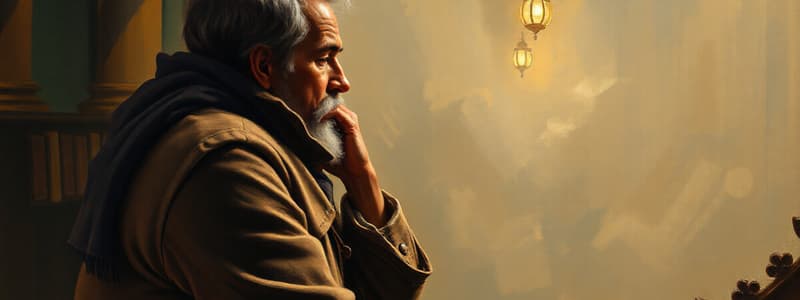Podcast
Questions and Answers
Which of the following is NOT one of Morgenthau's six tenets of political realism?
Which of the following is NOT one of Morgenthau's six tenets of political realism?
- International politics is primarily economic (correct)
- Interests of states collide in politics
- Politics is influenced by human nature
- State behavior is influenced by changing circumstances
Neorealism focuses on the immutable aspects of human nature as the cause of state behavior.
Neorealism focuses on the immutable aspects of human nature as the cause of state behavior.
False (B)
What is the primary goal of a state according to both strategic realism and neorealism?
What is the primary goal of a state according to both strategic realism and neorealism?
Security and survival
Anarchy compels states to invest in military power for their own protection, leading to a __________ that affects international relations.
Anarchy compels states to invest in military power for their own protection, leading to a __________ that affects international relations.
Match the following theorists to their contributions in realism:
Match the following theorists to their contributions in realism:
In the context of strategic realism, which of the following concepts refers to convincing others that threats are credible?
In the context of strategic realism, which of the following concepts refers to convincing others that threats are credible?
Conflict is considered inevitable according to strategic realism.
Conflict is considered inevitable according to strategic realism.
What does neorealism emphasize over human nature?
What does neorealism emphasize over human nature?
States exist in anarchy and must rely on __________ mechanisms for their security.
States exist in anarchy and must rely on __________ mechanisms for their security.
Which of the following best describes the primary concern of states according to neorealism?
Which of the following best describes the primary concern of states according to neorealism?
Which of the following is NOT a core principle of Classical Realism?
Which of the following is NOT a core principle of Classical Realism?
Machiavelli believed that leaders must always behave morally.
Machiavelli believed that leaders must always behave morally.
What does Hobbes argue is the main feature of the international system?
What does Hobbes argue is the main feature of the international system?
According to Morgenthau, politics is fundamentally a fight for the exercise of _____ over the people.
According to Morgenthau, politics is fundamentally a fight for the exercise of _____ over the people.
Match the historical proponent of realism with their primary concept:
Match the historical proponent of realism with their primary concept:
What is one key characteristic of modern realism?
What is one key characteristic of modern realism?
The statement 'The powerful does whatever it can, the weak suffers what it must' reflects the principles of Classical Realism.
The statement 'The powerful does whatever it can, the weak suffers what it must' reflects the principles of Classical Realism.
According to Machiavelli, what two qualities make the best allies of a prince?
According to Machiavelli, what two qualities make the best allies of a prince?
Classical Realism maintains that moral arguments have very little _____ in the international system.
Classical Realism maintains that moral arguments have very little _____ in the international system.
Who is known for the concept of 'animus dominandi' or 'thirst for power'?
Who is known for the concept of 'animus dominandi' or 'thirst for power'?
Flashcards
Political Pragmatism
Political Pragmatism
The idea that political decisions are made based on practical considerations rather than moral principles, especially in situations of crisis where the state's survival is at stake.
Classical Realism
Classical Realism
The belief that human nature is fundamentally egoistic and that states act in their own self-interest to maximize power and security.
Neorealism
Neorealism
The belief that international relations are primarily driven by the structure of the international system, particularly the absence of a central authority and the distribution of power.
Strategic Realism
Strategic Realism
Signup and view all the flashcards
Security Dilemma
Security Dilemma
Signup and view all the flashcards
Offensive Realism
Offensive Realism
Signup and view all the flashcards
Defensive Realism
Defensive Realism
Signup and view all the flashcards
Distribution of Capabilities
Distribution of Capabilities
Signup and view all the flashcards
Balance of Power
Balance of Power
Signup and view all the flashcards
Bipolarity
Bipolarity
Signup and view all the flashcards
What is Classical Realism?
What is Classical Realism?
Signup and view all the flashcards
What is the central focus of Classical Realism?
What is the central focus of Classical Realism?
Signup and view all the flashcards
What is the international system like, according to classical realists?
What is the international system like, according to classical realists?
Signup and view all the flashcards
How do classical realists view morality?
How do classical realists view morality?
Signup and view all the flashcards
Who are the key thinkers in Classical Realism?
Who are the key thinkers in Classical Realism?
Signup and view all the flashcards
What is the significance of the "Melian Dialogue"?
What is the significance of the "Melian Dialogue"?
Signup and view all the flashcards
How does Machiavelli's view on leadership relate to classical realism?
How does Machiavelli's view on leadership relate to classical realism?
Signup and view all the flashcards
How did Hobbes contribute to the development of Classical Realism?
How did Hobbes contribute to the development of Classical Realism?
Signup and view all the flashcards
How has Classical Realism influenced Modern Realism?
How has Classical Realism influenced Modern Realism?
Signup and view all the flashcards
What is Morgenthau's view of human nature and power?
What is Morgenthau's view of human nature and power?
Signup and view all the flashcards
Study Notes
Classical Realism
- Classical realism is the traditional approach to understanding relations between political entities.
- Key proponents include Thucydides (Peloponnesian War), Machiavelli (The Prince), and Hobbes (Leviathan).
- Core principles of classical realism include: security, inevitability of conflict, and the drive for power.
- The international system's structure significantly influences state relations.
- Moral considerations hold little sway in international politics.
- Foresight, caution, and logic are crucial for state survival.
- The powerful dictate outcomes; smaller entities suffer accordingly.
- Machiavelli argued that state survival justifies amoral actions.
- Hobbes emphasized that the international arena resembles a state of nature, where there's no higher authority.
- The international system's anarchy is a core tenet of realism.
Modern Day Realism
- Classical realists (Thucydides, Machiavelli, Hobbes) laid the groundwork for modern realism.
- The world is inherently hostile, with stronger states seeking dominance.
- States must accept their position within the hierarchy.
- Conflict is inevitable in the international arena.
- Cunning, resolve, and sometimes brutality are necessary for survival.
- History repeats itself, so recognizing patterns is important.
- Modern realists, like Morgenthau, systematized these principles.
Morgenthau's Realism
- Morgenthau's classical realism identifies a common human trait: animus dominandi (the thirst for power).
- This translates to a desire for both superiority and freedom from outside influence.
- Political power is central; states prioritize power acquisition and preservation.
- Ethical concerns should not interfere with pragmatic political action.
- Immoral actions might be necessary for state survival. (e.g., spying, lying, conspiring).
- Six tenets of political realism: human nature is egotistic, politics is autonomous, state interests clash, interests/circumstances change, private ethics mustn't obstruct politics, and nations mustn't impose values on others.
Strategic Realism
- Strategic realism is descriptive, not normative.
- States pursue their interests strategically and rationally.
- Rational choice theory and game theory are important tools.
- Credible commitment and deterrence are key elements.
- Uncertainty in international relations and misperception influence conflict.
- Diplomacy and bargaining can avoid conflict.
- This approach is connected to Machiavelli's views on statecraft.
Neorealism
- Neorealism provides a more scientific foundation to realism.
- It removes the emphasis on human nature, focusing instead on structural constraints.
- National interests are inherent and not discussed.
- International anarchy and the distribution of power are key.
- States seek to balance power through alliances or their own strength.
- The international system constrains state behavior.
- Survival and security are the primary goals.
- Predictable state behavior is a result.
Kenneth Waltz
- Kenneth Waltz is associated with neorealism.
- The international system's structure (e.g., bipolarity vs. multipolarity) determines its stability.
- International structure dictates state behavior, outcomes, and interactions.
Mearsheimer
- Mearsheimer's offensive realism argues that states prioritize power and hegemony.
- State security is maximized by dominance, not merely security.
Security Dilemma
- The security dilemma arises from anarchy, as states' attempts to enhance their security can negatively affect others.
- This cycle of insecurity can lead to arms races.
Studying That Suits You
Use AI to generate personalized quizzes and flashcards to suit your learning preferences.




